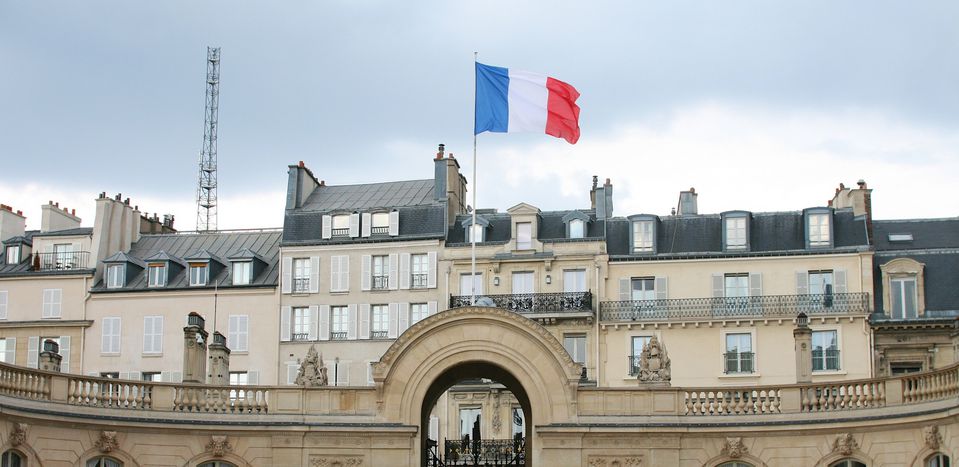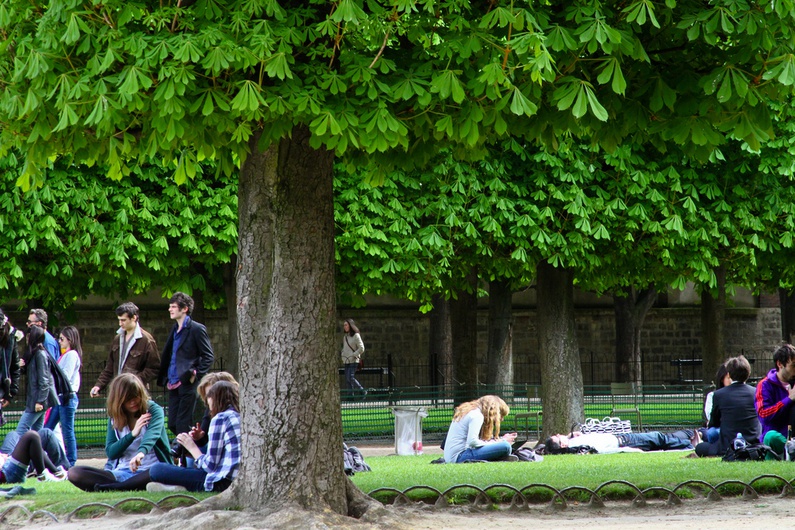
Daddy, can I be president now?
Published on
While many European countries are struggling with astronomical youth unemployment, a very select group of people still enjoy invulnerability to unemployment or diminishing power in France. From systemic favouritism to dampening productivity, the culture that once produced the Social Contract is forced to slowly mend the wounds of its outdated education system.
“I have my own ideas as to what a future society should look like. […] At the most general level, we should be seeking out forms of authority and domination, and challenging their legitimacy. Any form of coercion and control requires justification. And most of them are completely unjustifiable. Now, at various stages of human civilization, it’s been possible to challenge some of them, but not others. Others are too deep-seated, or you don’t see them.” - Noam Chomsky, 1992
As the French nation is looking to battle through its economic downturn of the last couple years, a solution is still not in clear sight. Attention must be turned to systematic errors that are gnawing at the core of the economy. One such rodent remains the incumbent elitist education system, which has shaped the country for centuries and influences both politics and the economy on innumerable levels. The question is, to what extent can this system be reformed or even abolished in order to restore a modern way of education and economic invigoration in France.
Relating to a worldwide concern on elitism, political outcry has often been misdirected at the lower income population within the social system, as part of a blame game. Investigative critics who speak against the selective education system are often downplayed as either maniacal or politically left ideologists, to discredit their opinion. All the while the impact of the situation is evident both socially and economically, as school students are tortured with needless academic pressure and workers are segregated by academic degree. Although steps have been made in the right direction, one needs to comprehend the depth of the French ‘old-boy network’ before dismantling it.
Inegalité, Fraternité, Liberté
 A tumour on French social equality, the so-called grandes écoles (fr. “grand schools”) system of higher education can be made responsible for not only widening the social gap, but also negatively impacting the economy. As remnants of the late 18th to early 19th century, these crassly selective colleges have their objective in creating an elite educational environment. To enter, a student must pass an infamously tedious exam, based purely on analytical skills. Once accepted, students of the top grandes écoles are practically guaranteed a top position in either politics or business. Major criticism has arisen over statistics showing a distinct advantage for students from privileged households when applying to these top universities.
A tumour on French social equality, the so-called grandes écoles (fr. “grand schools”) system of higher education can be made responsible for not only widening the social gap, but also negatively impacting the economy. As remnants of the late 18th to early 19th century, these crassly selective colleges have their objective in creating an elite educational environment. To enter, a student must pass an infamously tedious exam, based purely on analytical skills. Once accepted, students of the top grandes écoles are practically guaranteed a top position in either politics or business. Major criticism has arisen over statistics showing a distinct advantage for students from privileged households when applying to these top universities.
This selection by merit does not mirror the diversity of French society credibly, as the share of working-class students in the top grandes écoles fell from 29% in the 1950s to 9% by 2000. A drop that these schools themselves have noticed and officially combat, all the while not loosening their grip on politics and economy. A 1900 parliamentary report by then-prime minister Alexandre Ribot outlines how little has changed in the past century: "[Such a system which] classifies men at the age of 20 based on the diplomas they have received deprives the state of the right to choose those who are outstanding, self-made professionals".
But, is this really uncommon? Realistically speaking, any country will develop “natural” elite schools, such as Oxbridge (Oxford + Cambridge) in the UK or the Ivy League (Harvard, Yale, Princeton, etc.) in the US. In France however, the difference hides in the unusually high correlation of total enrollments in these schools compared to graduates then becoming part of the top public sector. On top of that comes the selection of students for these schools, which assuredly is tipped in favour of well-off French families.
The Grandes Écoles are your friend
In his book “France’s got talent: the woeful consequences of French elitism”, British expat Peter Gumbel writes in depth about his research on grandes écoles demographics, specifically the most selective ones. While the totality of the system may comprise of well over 200 schools, Gumbel claims that the French public sector has mostly suffered from two at its core: the École Nationale d’Administration (ENA) and the École Polytechnique.
The facts are quite convincing: Current president François Hollande is a graduate of the ENA. So were former presidents Jacques Chirac (1995 - 2007) and Valéry Giscard d'Estaing (1974 - 1981). In fact, although the énarques (ENA graduates) only hold 5% of all parliamentary seats in France, they represent 80% of all finance cabinet positions and 75% of ministers cabinets for the past 40 years, according to the political think tank iFRAP. The only time those numbers fell was during the recent presidency of Nicolas Sarkozy (2007–2012), himself a graduate of grande école Sciences Po.
Besides their political griphold, these two grandes écoles also provide a fair share of their best to the private sector:
40% of CAC indexed companies CEO’s are ENA or Polytechnique graduates.
Of 564 top executive positions, 84% are held by that same group.
Obviously, this could mean that the two schools are exceptionally large to allocate so many of their graduates so comfortably. Yet, while Harvard alone admits about 2,000 undergraduates every year and Oxbridge does the same for 3,400, both ENA and Polytechnique grant 480 yearly admissions - combined.
An elitist dilemma
As mentioned, the existence of elitist schools should itself not pose a problem. They are, after all, all around. Whether in Sweden, in the US, or in France, universities and colleges naturally divide themselves into more or less prestigious institutions, based mostly on their alumni network. The real issue in France however, is that this network is not able to adapt to changes in ethnicity, culture and gender as quickly as the country that surrounds it. It is more concerned in spitting out top managers, ready-made in suit and tie, delicately called cadre (i.e. top manager).
The question is not whether these schools are or aren’t accepting different layers of society anymore, but rather whether these schools are capable of further serving their community. The aforementioned entry exam has become a quest to find the most analytical students, not the most creative or innovative. It presents a logical step in the meritocratic education, engraved in the Gallic nation. The schools play right in the hand of the grandes écoles instead of encouraging out-of-the-box thinking.
In a previous book by Gumbel, “On achève bien les escoliers?” (They shoot schoolchildren, don’t they?), the writer exposes the largely inefficient and similarly outdated education in French schools. Following the devastating announcements of French school students falling behind in a 2009 OECD study, the country's ministers were looking for explanations. The answer they found was the omnipresent merit-based testing, such as the preparatory classes for the grandes écoles that was conditioned on students from primary school.
Luc Chantel along with Richard Descoings were two prominent speakers in opposition of such meritocracy imposed on French students. Chantel, education minister of France between 2009-2012, raised concerns about the structure of the system, which has among the longest school days in the world, yet fails to produce “brighter” students in comparison. Descoings, the late director of Sciences Po, went further in attacking the very delicate topic of meritocracy at the heart of French education.
In a country where one of the most-renowned newspapers, Le Monde, until recently still mentioned the university entrance exams results of the deceased in the obituaries section, it is no surprise that changes to the education system come slowly. Yet, the grade attained by students at the early age of 18 will go on to mark their entire life. On top of that, the OECD report clearly showed the stagnant performance among high-achieving students and a steep decline for the lower marked quarter of students. This meant that not only were students not improving, but they were being actively segregated.
In light of this, many schools, such as the Lou Redounet Collège of Uzès, have tried to adapt a curriculum that is not exclusively academic. Here, the school administration has tried to encourage the teachers to move away from lecture-style classrooms and vary their lessons in accordance to their students. In that, the education union of France, UNSA, have made clear signals towards these schools that it is a desirable change, yet the final cut is with the teachers themselves. And some teachers have been hard to convince according to the union. “We need to tell them that their job is not only to teach, but to educate [...] They need to become educators in the widest possible sense,” said Descoings.
The impact of elitism on the economy
In tough economic times, the classic social state passes a stress test. An antiquated education system that produces excellent analysts at its helm is of little to no use when it comes to finding innovative ways out of a recession. As the Harvard Business Review described this fault in the system in a 1991 article about French managers: “The bias is for intellect rather than for action.”
Last year, French journalist and former Boston College lecturer on management, Monique Valcour, wrote an article in the Financial Times in about the unsuitability of the elitist system in a “dynamic global business and career environment”. To her, French students are not only unprepared on a business level within their own country, but are all the more direly prepared for what is going on outside of France. Foreign languages statistics underline this statement. Although over 99% of students in France are enrolled in English language classes, only 14% aged between 14-15 are competent in using the language based on an EU Commission statistic from 2010. This compares negatively to a 82% competence in Sweden or Malta in the same age group.
As the world becomes more tight-knit, France is bound to adapt, not just in terms of language, but also business mindset, as Valcour outlines. In an EY study of 2011, the French scored lowest on a self-evaluation on how much their culture encourages entrepreneurship, only 4 % agreed. That score lay behind Russia (8%) and the EU average (22%), putting them in last place of the G20 nations. Not a surprise, as some of the administrative hurdles involved in starting a company in France are incomprehensible. The foundation of a simple S.A. or SARL (similar to a LLC) company, for example, will cost you an average €3,000, just in fees, before taxes.
French administrators are noticing this, albeit slowly. As Gumbel, Descoings and other functionaries draw attention to the elitist thinking problem, it becomes unavoidable for politicians. Some changes have been implemented over the last few years. Even though it might take decades to take effect, the direction away from elist education has been set.
Changes ahead
The first steps away from the old-fashioned ways of education have been taken by the grandes écoles themselves. As the Sciences Po was first to gain ground on employing foreign professors and enrolling foreign students, others, including the ENA, noticed the positive effect it has on the schools network. Since 2003, the foreign student proportions at ENA has been kept steady at almost 40%.
Other fast-evolving elite institutions include the HEC and Essec business schools, who have been priding themselves with both a international curriculum and wider recognition. Although they retain the rigid entry exams, their enrollment has become arguably more inclusive than before. What matters most is the path of crumbs they lay for smaller colleges to move in the same direction and secondary schools to accept fundamental changes to their syllabus.
On top of that, the French government has been easing company registration taxation, allowing a flood of startups and incubators. The auto-entrepreneur law that went into action in 2009 allowed single founders to launch a business with virtually no administrative fees. By 2014, there were 911,000 registrations, hinting at the relaxation of constraints over the years. This has led France to match the EU average in the aforementioned EY entrepreneurship barometer study by 2013.
The array of problems is not solved, as politicians like Hollande still surround themselves with their “Old Boys club” and the country’s social gaps are growing. It is sure however, that the time of the classic intelligent elite will succumb to the creative problem-solver in France. As “traditional” employers are failing and the wealthy flee higher taxation, the task is up to the teachers and elite universities to adapt as quickly as they can in order to encourage the most unlikely of students to reach their goals.



